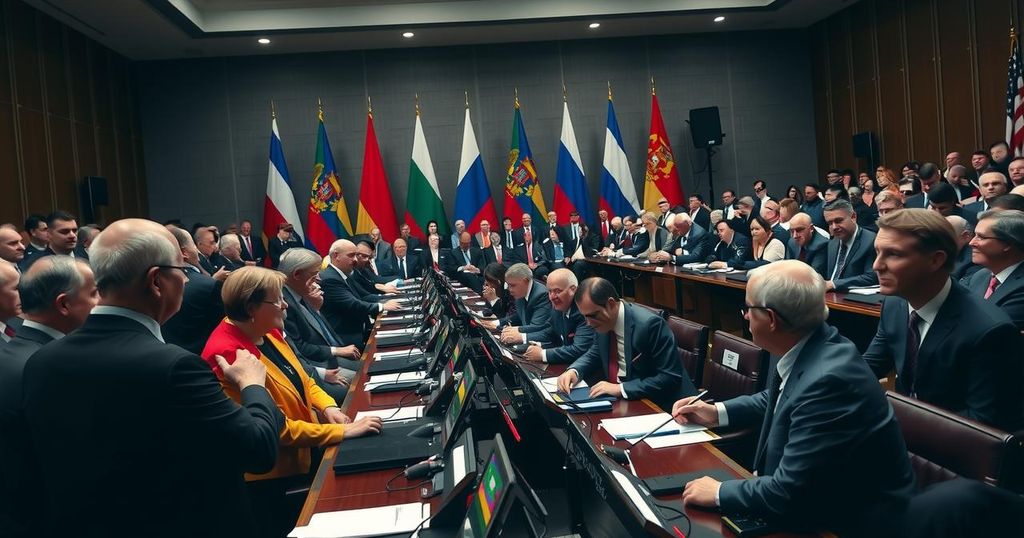Putin Hosts Major BRICS Summit, Asserting Russia’s Global Relevance
Vladimir Putin hosts a summit with 36 world leaders as part of the BRICS group, aiming to counteract the perception of Russia’s isolation amidst ongoing conflict in Ukraine. The attendance of influential figures like the UN Secretary-General remains uncertain, while discussions focus on reducing dependence on the U.S. dollar and enhancing global cooperation among developing nations. With the expanded BRICS group presenting a united front, the summit highlights the increasingly complex geopolitical climate and Russia’s aspirations within it.
Russian President Vladimir Putin has hosted a significant summit involving 36 world leaders from various nations, including key players such as China, India, and Iran. The meeting, part of the BRICS group, aims to project an image of Moscow as an active participant on the global stage, despite being largely ostracized by the West and facing serious allegations from the International Criminal Court regarding the abduction of Ukrainian children. The summit marks the largest international gathering facilitated by Putin since the onset of the full-scale invasion of Ukraine in February 2022, and it includes discussions with prominent leaders like Xi Jinping of China and Narendra Modi of India, alongside numerous bilateral meetings. Notably, the attendance of United Nations Secretary-General António Guterres remains uncertain, with mixed messages regarding his potential participation in defiance of Western pressures. Aside from Guterres, other attendees include Palestinian President Mahmoud Abbas and leaders from various nations such as Algeria, Azerbaijan, Belarus, Indonesia, and Mexico. The expanded BRICS group, which now encompasses not only the original five members—South Africa, Russia, China, Brazil, and India—but also countries like Egypt, the United Arab Emirates, and Iran, is perceived as a counterbalance to Western economic dominance, particularly in relation to the U.S. dollar. The Iranian president has remarked, “BRICS can be a way out of American totalitarianism and create a path of multilateralism.” However, the alliance faces challenges in maintaining ideological cohesion, particularly given the varying levels of interest in moving away from a dollar-centric economy among its member states. Analysts suggest that this summit is a strategic advantage for Putin, reinforcing the narrative that Russia is far from being an isolated state, but rather a key player in a coalition poised to influence the future of the global order. As tensions and complexities regarding the Ukraine conflict evolve, the summit may signal a shift in dynamics, with implications for international diplomatic relations moving forward. While the collective economic weight of BRICS+ eclipses that of traditional alliances like the G7 or the EU, the group struggles to translate this into equivalent financial influence within global institutions, predominantly due to the voting power structure based on financial contributions to the International Bank for Reconstruction and Development (IBRD).
The BRICS, originally formed by Brazil, Russia, India, China, and South Africa, has evolved to include a broader array of nations, seeking to function as a counterbalance to Western domination, especially through the use of the U.S. dollar in global economic transactions. This summit comes at a critical time, as Russia navigates international scrutiny amidst ongoing military conflicts and diplomatic isolation from Western powers. The assembly of diverse nations under the BRICS banner underscores a collective vision to foster economic independence from Western pressures and enhance multipolarity in international relations. The potential attendance of significant figures like the UN Secretary-General symbolizes the sensitivity of geopolitical allegiance and the varied responses to Russia’s actions on the world stage, particularly regarding the Ukrainian crisis.
The BRICS summit hosted by Vladimir Putin signifies a pivotal moment in the group’s evolution and Russia’s attempt to reinforce its standing in global affairs, challenging the perception of isolation. The participation of various nations, alongside discussions aimed at promoting financial independence from the U.S. dollar, highlights the group’s dual function of collaboration and ideological diversity. As the geopolitical landscape continues to shift, the implications of this gathering stretch beyond immediate economic concerns, potentially altering diplomatic relations and future interactions among the world’s leading economies. The outcomes of such meetings could lay groundwork for a redefined international order, one in which BRICS members seek to assert greater influence amidst existing tensions.
Original Source: www.theguardian.com




Post Comment